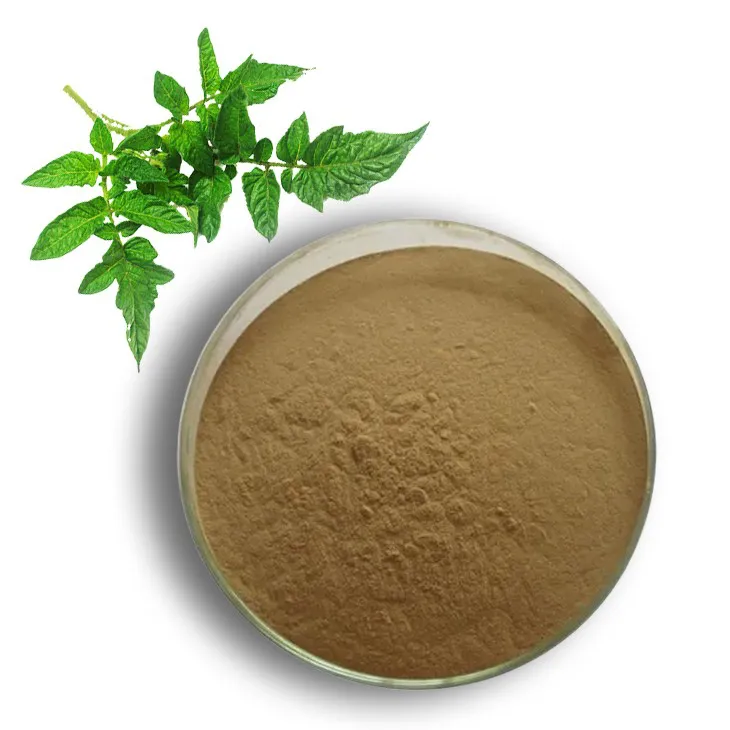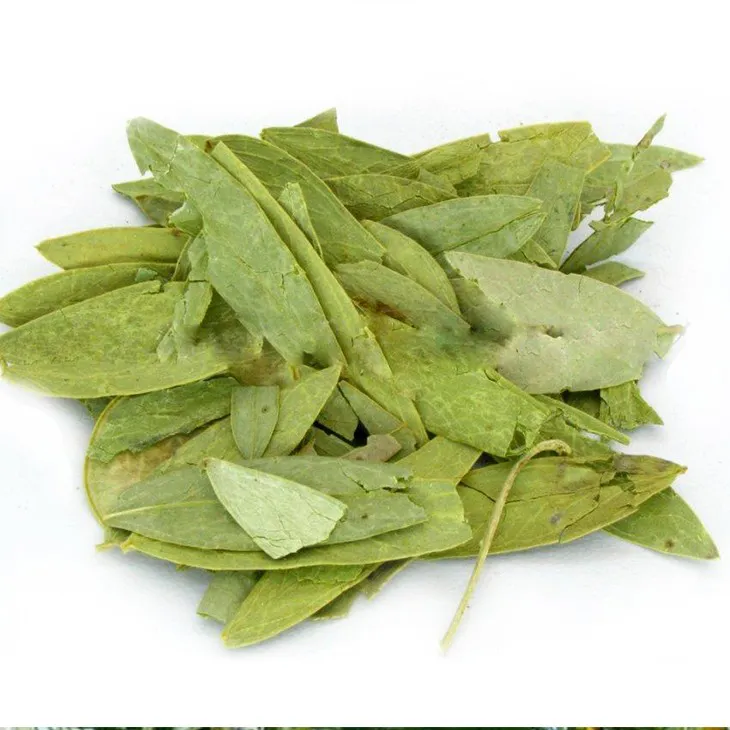- 0086-571-85302990
- sales@greenskybio.com
What is senna leaf extract? Definition, types, history and nutritional value.
2024-12-11

1. Definition of Senna Leaf Extract
Senna Leaf Extract is a substance derived from senna plants. It is the result of a process that involves extracting and concentrating the active components present in the leaves of senna plants. The two main types of senna plants used for this purpose are Cassia angustifolia and Cassia acutifolia. The extract is a complex mixture of various chemical compounds, with sennosides being the most important ones in terms of its physiological effects.

2. Types of Senna Leaf Extract
2.1 Cassia angustifolia - related Extract
Cassia angustifolia, also known as Tinnevelly senna, is a plant native to India. The senna leaf extract obtained from this plant has been used in traditional medicine for centuries. It contains specific sennosides in a particular ratio, which gives it its characteristic properties. The extract from Cassia angustifolia is often used in herbal remedies and dietary supplements due to its potential health benefits related to digestion.
2.2 Cassia acutifolia - related Extract
Cassia acutifolia, or Alexandrian senna, is another important source of senna leaf extract. This plant is mainly found in North - East Africa. The extract from Cassia acutifolia also contains sennosides, but the overall composition may vary slightly from that of Cassia angustifolia. It has been widely used in different cultures for its laxative effects. In the pharmaceutical and herbal industries, both types of extracts are used depending on various factors such as availability, cost, and specific requirements of the products.

3. History of Senna Leaf Extract
The Ancient Use Senna leaf extract has a long and rich history in herbal medicine. It has been used in traditional medicine systems for thousands of years. In ancient Egypt, senna was already known for its medicinal properties, especially in relation to digestive health. The use of senna was documented in ancient Egyptian papyri, which shows that it was used to treat constipation and other gastrointestinal disorders.
Medieval and Renaissance Periods During the medieval and Renaissance periods in Europe, senna was introduced to the Western world through trade routes. It became an important ingredient in the apothecary's toolkit. Herbalists and physicians in Europe started to use senna - based remedies for various ailments, mainly those related to the digestive system. However, the use was also carefully regulated due to its potent effects.
Modern Times In modern times, with the development of scientific research and extraction techniques, senna leaf extract has been further studied and refined. It is now used not only in traditional herbal medicine but also in the production of modern pharmaceutical products. The active components of senna leaf extract have been isolated and analyzed, which has led to a better understanding of its mechanisms of action and potential side - effects. However, the traditional knowledge about senna still plays an important role in guiding its use in some herbal and alternative medicine practices.

4. Nutritional Value and Health Benefits
The Role of Sennosides Sennosides are the key components in senna leaf extract that are responsible for its main health benefit - promoting bowel movement. Sennosides work by stimulating the muscles in the colon, which helps to increase peristalsis, the wave - like contractions that move fecal matter through the intestines. This makes senna leaf extract an effective laxative, especially for those suffering from constipation. However, it should be noted that the use of senna leaf extract as a laxative should be short - term and under the supervision of a healthcare professional, as long - term or improper use can lead to potential side - effects.
Antioxidant Properties Senna leaf extract may also possess antioxidant properties. Antioxidants are substances that can protect the body's cells from damage caused by free radicals. Free radicals are unstable molecules that can cause oxidative stress in the body, which is associated with various diseases such as cancer, heart disease, and neurodegenerative disorders. Although more research is needed to fully understand the antioxidant potential of senna leaf extract, some preliminary studies have shown promising results in this regard.
Potential Anti - inflammatory Effects There is also some evidence suggesting that senna leaf extract may have anti - inflammatory effects. Inflammation is a natural response of the body to injury or infection, but chronic inflammation can lead to many health problems. The anti - inflammatory properties of senna leaf extract may be related to its chemical composition, particularly some of the secondary metabolites present in the extract. However, further research is required to confirm these effects and to understand the exact mechanisms involved.
5. Precautions and Potential Side - Effects
Overuse and Dependency One of the main concerns with senna leaf extract is overuse. If used for a long time or in excessive amounts, it can lead to a dependency on laxatives. This means that the colon may become less responsive to normal stimuli for bowel movement, and the body may rely on the laxative effect of senna leaf extract to have a bowel movement. This can disrupt the normal function of the digestive system and may require medical intervention to correct.
Electrolyte Imbalance Another potential side - effect of senna leaf extract is electrolyte imbalance. Since it promotes bowel movement, it can cause excessive fluid loss through the intestines. This can lead to a loss of important electrolytes such as potassium, sodium, and chloride. Electrolyte imbalances can have serious consequences on the body's normal physiological functions, including heart rhythm, muscle function, and nerve conduction.
Interaction with Medications Senna leaf extract may also interact with certain medications. For example, it may interact with cardiac medications, anti - arrhythmic drugs, and some diuretics. These interactions can affect the efficacy and safety of the medications. Therefore, it is very important to inform your healthcare provider if you are taking senna leaf extract while on other medications.
6. Conclusion
Senna leaf extract is a substance with a long history in herbal medicine. It has two main types related to different senna plants, and it contains sennosides which play a crucial role in its effects on the digestive system. While it may have potential health benefits such as promoting bowel movement, antioxidant, and anti - inflammatory properties, its use should be carefully monitored due to the potential side - effects. As with any herbal or dietary supplement, it is always advisable to consult a healthcare professional before using senna leaf extract.
FAQ:
What are the main types of senna leaf extract?
The main types are related to extracts from Cassia angustifolia and Cassia acutifolia.
How is senna leaf extract defined?
It is defined as the essence that is extracted and concentrated from senna leaves.
What is the history of senna leaf extract in herbal medicine?
It has a long history in herbal medicine, mainly known for promoting bowel movement.
What is the main nutritional value of senna leaf extract?
The sennosides in it play a major role in its function on the digestive system.
What should be noted when using senna leaf extract?
Its use should be carefully monitored to avoid potential side - effects.
Related literature
- Senna Leaf Extract: A Comprehensive Review of Its Properties and Applications"
- "The History and Nutritional Significance of Senna Leaf Extract"
- "Types of Senna Leaf Extract and Their Impact on Health"
- ▶ Hesperidin
- ▶ Citrus Bioflavonoids
- ▶ Plant Extract
- ▶ lycopene
- ▶ Diosmin
- ▶ Grape seed extract
- ▶ Sea buckthorn Juice Powder
- ▶ Fruit Juice Powder
- ▶ Hops Extract
- ▶ Artichoke Extract
- ▶ Mushroom extract
- ▶ Astaxanthin
- ▶ Green Tea Extract
- ▶ Curcumin
- ▶ Horse Chestnut Extract
- ▶ Other Product
- ▶ Boswellia Serrata Extract
- ▶ Resveratrol
- ▶ Marigold Extract
- ▶ Grape Leaf Extract
- ▶ New Product
- ▶ Aminolevulinic acid
- ▶ Cranberry Extract
- ▶ Red Yeast Rice
- ▶ Red Wine Extract
-
Saw Palmetto Extract
2024-12-11
-
Selenium yeast
2024-12-11
-
Hesperidin
2024-12-11
-
Golden Seal Extract
2024-12-11
-
Plantain extract
2024-12-11
-
Natural grape seed extract
2024-12-11
-
Acerola Juice Powder
2024-12-11
-
Kelp Extract Powder
2024-12-11
-
Polygonum multiflorum extract
2024-12-11
-
Uridine-5'-monophosphate Disodium salt
2024-12-11





















